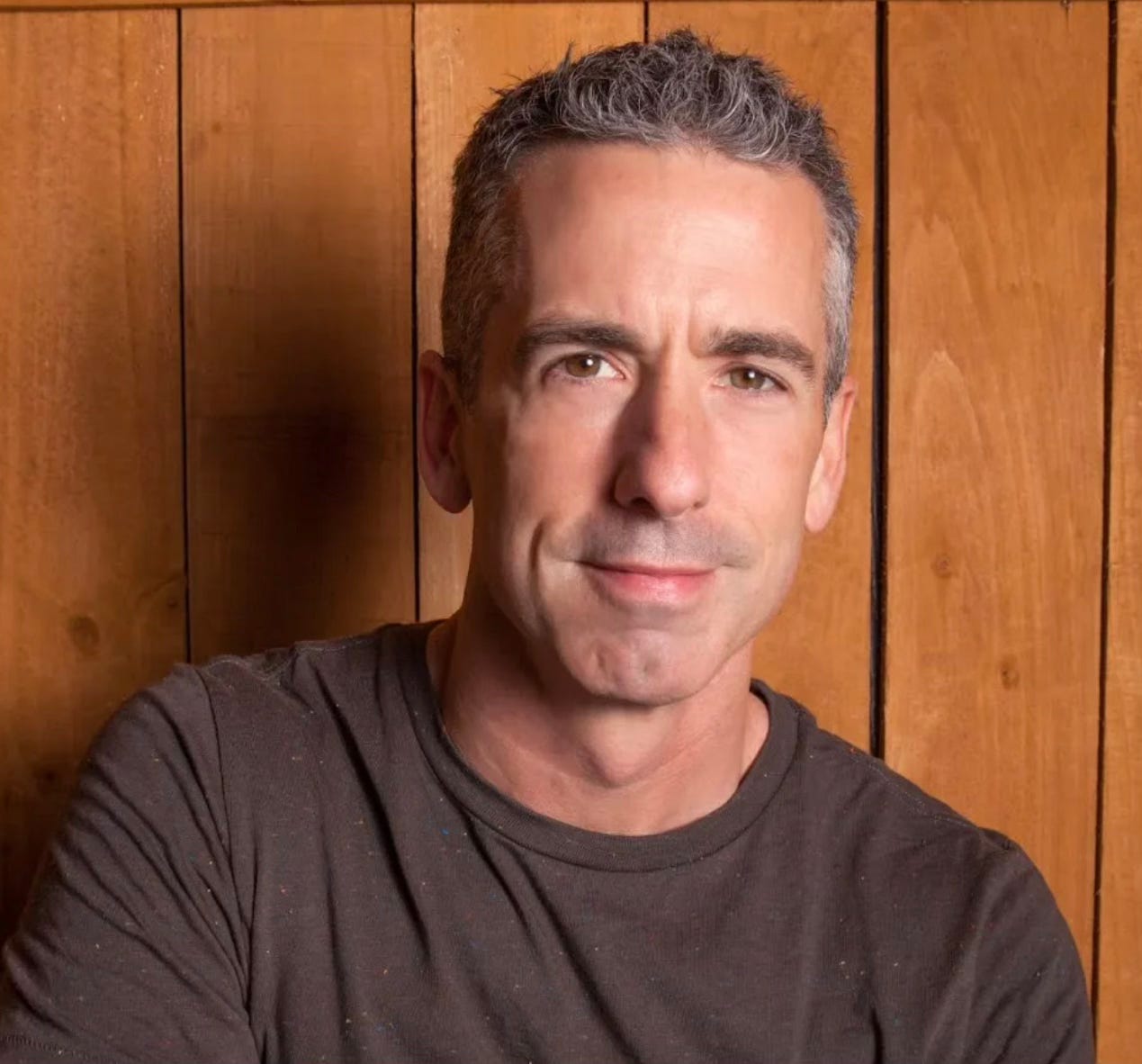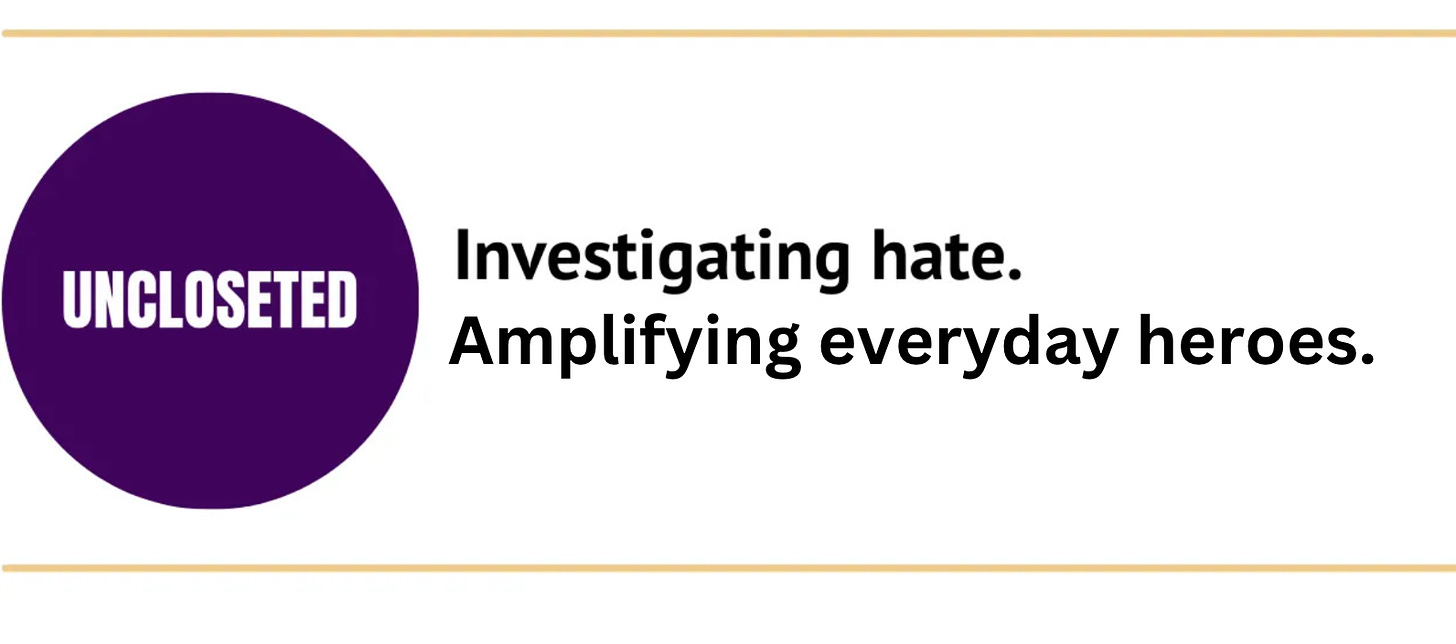Sex, love and romance have historically been viewed through the lens of monogamy, with any hook-up outside of your primary relationship seen as the ultimate sin. But in recent years, these norms have started eroding: According to a 2023 survey, 34% of Americans describe their ideal relationship as not entirely monogamous.
In addition, the youngest generation of adults—Gen Z—are having less sex and fewer one-night stands than their millennial counterparts. This is all occurring at a time when more people than ever are identifying as something other than straight and when pop culture is pushing the envelope on sexual storylines, including plotlines of sibling incest on “White Lotus” and “Monsters.”
To make sense of all of this, we called up legendary sex columnist and LGBTQ activist Dan Savage—who coined the term “monogamish”—to get his take on all things sex in America in 2025.
Watch the full interview above or read the transcript here:
Spencer Macnuaghton: Hi, everyone. I am here with Dan Savage, American sex columnist, journalist, LGBTQ activist, and the host of the very popular podcast “Savage Lovecast.” Dan, thank you so much for chatting with me and Uncloseted Media today.
Dan Savage: Thank you for having me.
S.M.: Well, I want to get started right away with a question I'm super personally curious about. You kind of coined the term “monogamish.” How would you describe the state of monogamy in America in 2025? Where are we at with it? Obviously, it's evolved.
D.S.: More people are, I think, moving toward what gay men have always done. For gay male couples, monogamy's always been an opt-in. It's been an active choice and not a default setting. It was something that was discussed and chosen by the couple. And it could be unchosen; it could be renegotiated. But now you see more straight people thinking about monogamy and choosing it if it's right for them in the same way that monogamy as a choice had been right for other gay couples. Those being choices a couple makes together. That choice can be renegotiated over the life of a relationship. And what works for you in the first few years, the first 5 years, the first 10 or 20 years, may not be what works for you 20 years in as a couple. You may choose something else along the way.
Gay people who were in open relationships tended to be out about it because you couldn't be gay without being out about something that was hard to talk about. And that might upset some people. And then everything else about your sexuality after you come out as gay just feels less scary. You know, these things that for straight people often feel like mountains, for gay people feel like molehills.
But as more gay people came out, and more straight people got to know gay people, what straight people saw was that our relationships [and] our sex lives were organized differently and more actively chosen, that we didn't just default to settings around sex roles, gender roles, gendered expectations, housework, child-rearing … straight people began to look at gay couples, look at gay relationships, look at the gay people that they knew and modeled their relationships a little more closely after ours.
A lot of the gay men that I know who say they're in monogamous relationships, when I drill down with them, I think, ‘Oh, no, that's monogamish. That's monogamous with some squish.’ And it was a word I coined early in my relationship with my husband, Terry.
We've been together 30 years. We were monogamous for the first four. And then we were non-monogamous. And when we started being honest about being not monogamous, 26 years ago and we were new parents and we were honest about it. Straight people, friends and even other gay people would make an assumption about the amount of sex we were having with other people and whether we were even having sex with each other anymore. And at that stage in our relationship when either of us were having sex, it was usually with each other and very rarely with a very special guest star. And we were more monogamous than not. And that's when I came up with “monogamish” to describe these relationships that exist as the primary commitment that, you know, it's mostly just the two of these people who have sex with each other. And then every once in a while, there's some allowance for outside sexual contact by mutual agreement, but it's very minimal.
S.M.: In your years of looking at this, talking to people about the idea of monogamy, are there any hard and fast rules for people watching this who might be considering it where you’re like, ‘These are the things I’ve noticed work in non-monogamous relationships?’ Because people have really strong opinions on whether or not non-monogamy can even work.
D.S.: Which is insane when you consider the divorce rate, when you consider serial monogamy. It's not like non-monogamy is chaos and monogamy is stability and nobody in a monogamous relationship has ever been dumped, divorced, or cheated on.
What makes a relationship work, monogamous or non-monogamous, is honesty, communication, accommodation, and some allowance for human failure. I'm always saying to people in monogamous relationships that if you're with somebody for 50 years and they cheated on you twice, they were really good at monogamy. It's insane to define [romantic relationships as just monogamous], and the only definition of success is flawless, perfect execution over five decades. That's a standard we apply to no other human endeavor. People fall down. And if you want your monogamous relationship to be resilient and survive an infidelity, which is common in monogamous relationships, you need to have a framing of your monogamous relationship where it could survive that.
I'm always saying to people that if you define cheating as unforgivable, and then you define everything as cheating, then your relationships are not gonna survive for very long. When it comes to stability in a long-term committed relationship, you want to have a very narrow definition of cheating. You don't want lots of things to count so that you don't wind up feeling like you have to break up over and over again. Because, [for example], your partner liked somebody's photograph on Instagram, which I keep seeing held up as evidence of an infidelity, which is just insane.
S.M.: And I remember, it was about 10 years ago, it was one of my first journalistic articles, it was a big deal for me, I wrote an article in The Guardian and the headline was “How Gay Men are Making Open Relationships Work,” and the research then at least showed that it's gay men who were doing this, not as much same-sex couples that are women. Is that still the case today? And how do you explain that?
D.S.: You can't have this conversation without tiptoeing into generalizations about four billion people on the one hand and four billion people on the other. But there are differences between male and female sexuality, and you see those play out in the differences between gay male sex cultures and relationship cultures and lesbian sex cultures and relationship cultures.
The relationships most likely to be monogamous are lesbian relationships. The relationships less likely to be monogamous are opposite-sex relationships or straight relationships. The least likely to be monogamous are gay male relationships. Paradoxically, the people who are least likely to divorce are gay male couples; more likely are straight couples, and most likely are lesbian couples.
So non-monogamy correlates and may have a causal relationship with relationship stability, and not what everyone assumes it's gonna correlate strongly with, which is relationship instability. I can’t remember the name of the sex researcher, I quote her in one of my books, but she said, ‘Every monogamous relationship is a disaster waiting to happen.’
S.M.: Do you believe that?
D.S.: Kinda. Yeah, especially if that couple is unrealistic about what cheating is and means. When Terry and I became parents, we were monogamous. And one of the things we had to talk about was, before I was comfortable doing the adoption of our son was, ‘What happens if one of us cheats?’ And Terry's attitude was, ‘If you cheat on me, it's over.’ And my response was, ‘Then we shouldn't do this. Not because I'm gonna cheat on you, not because I plan on it, but that could happen. And so if our default, if that should happen, is the relationship ends, we're adopting a child into a home that has a very shaky foundation.’ I get uncomfortable saying this because I know tons of insanely horny women who like casual sex and sex is external for them in a way that it can be for men, but men tend to have higher sex drives than women do. Sex is potentially much more consequential for women, for assigned female at birth persons, because the risk of pregnancy, the risk of STI transmissions are higher and the potential consequences are greater, and then you have to factor into that the risk of male violence and males being stronger than females and how much bigger a threat that is for women which all ups the opportunity costs of impulsive sexuality or casual sex for women.
S.M.: How about straight people getting in the mix on non-monogamy? Because I have a lot of straight friends who are doing the 2.1 kids, the monogamous relationship, buying the home, that kind of thing, which I kind of almost equate to being old school now in 2025. So what's changing now when it comes to straight people and being a little bit more open-minded when it comes to non-monogamy?
D.S.: The straight lifestyle was marriage, monogamy, children. And that was straight to the extent that gay people were excluded from that. But also straight people were under incredible pressure to marry and have children whether they wanted to or not, especially women for all of recorded human history.
What you see now is lots of straight couples now leading the quote-unquote gay lifestyle of multiple partners, not settling down. And I think this is fascinating.
S.M.: A lot of couples might be thinking right now, ‘Hey, I want to explore opening up my relationship. I don't know how to broach the subject.’ What's your advice to couples who might be thinking, ‘I kind of want to have the conversation, but I'm too afraid to do it?’
D.S.: Early in the relationship, you should have the conversation. It's hard 15 years in to retroactively have the conversation about your expectations, especially if you just defaulted to the assumption that love means monogamy and monogamy means love. I think people should say at the start, like, ‘We're monogamous. We're choosing monogamy. We can talk about this down the road if we need to, right?’ Life is long, and what matters to you very much at the start might not matter to you at all 20 years in.
But how do you have that conversation? You just risk it. But you can't un-have that conversation. If your partner feels betrayed because you would even want to have sex with somebody else ever under any circumstance, you can't un-make that.
We're told this lie that if you're in love, you're not going to want to fuck other people. And so not only should a monogamous commitment come easy, we shouldn't even have to make it if that's how it actually worked. The monogamous commitment comes into force and matters when there is desire to fuck other people, the impulse, the temptation. That's when you have to honor the monogamous commitment. That's when it's will, that’s when it’s meaningful—it's a sacrifice. And monogamous people would be more satisfied in their relationships if they could recognize the sacrifice and honor it and take the win that it is. I know a lot of people identify as monogamish who don't have sex with other people. They just use that to describe that they are monogamous but they recognize that, of course, there is desire for other people, crushes on other people, attractions to other people. And if you can allow for that, you're going to make your relationship much more stable.
S.M.: I want to pivot to Gen Z a little bit. Studies indicate that Gen Z is engaging in sexual activities less frequently than previous generations. One survey found that about 40% of young adults had no sexual partners in the prior year. Why do you think that is? I find it interesting because I think if Gen Z's becoming more queer and more liberal, wouldn't you expect them to have more sex?
D.S.: It is odd. So much has changed. We're isolated now and endlessly entertained now and diverted now in ways we didn't used to be. If you wanted to meet people, you used to have to leave the house. And that process of leaving the house, interacting with people, going places, doing things, gave you the skillset that you needed to negotiate the kind of interpersonal human relationships and connections that could be sexual, that could lead to romantic connections. And with social media's ability to make us think we’re creating those connections without having to do the work of meeting people and being face-to-face has undermined that skillset. It's also, you know, we live in a culture and at a time where the consequences of putting a foot wrong erotically or sexually in a charged environment can be high, especially for young men—and rightly so.
There's also the tsunami of porn and the ability to get a lot of your sexual needs met, again, without having to leave the house. If I wanted to look at porn when I was 16 years old, I had to go shoplift it.
I had to leave the house, and now you don't. And there are people who get their sexual needs met virtually now and derive so much satisfaction from the virtual meeting of their sexual needs that they don't feel particularly motivated to get out there in "meet space" and try to find somebody in that imperfect world. You know, our fantasies are always perfect.
Our sexual fantasies, our erotic fantasies, our masturbatory fantasies—they're always perfect, but they used to be limited to what we could imagine or picture, like the little bit of porn we could get our hands on. And now, with the Internet, they can be fully realized two-dimensionally. And for some people, real-life sex and negotiating real-life sex is not as attractive and is not as satisfying as the perfect two-dimensional virtual sex that they can get online.
S.M.: This is a trickier question. I don't know if you've been watching “White Lotus.”
D.S: I have.
S.M.: So, you know, “White Lotus,” obviously season three, Patrick Schwarzenegger and Sam Nivola, they play brothers and there is an incest storyline. And they officially hooked up in the last episode, the brothers. And it was [the show’s] highest-rated episode ever with 4.2 million viewers. It broke the internet. Everyone's talking about it. There was also an incest storyline in Ryan Murphy's Netflix series about the Menendez brothers, and I found it really interesting that these are two very conventionally attractive men who are engaging in incest storylines that are breaking the queer internet over an issue that's really taboo and really problematic. So I'm curious what you think about all that as this has almost become mainstreamed and in a way glamorized by Hollywood.
D.S.: Incest is the number one search category on Pornhub. There's stepbrother, stepsister porn, stepmother porn—huge genres. What does it tell us that there is this desire for the representation of this kind of transgression? When you drill down on people with incest fetishes, as opposed to actual sexual abuse within families, that kind of incestuous criminal behavior, what you find are people who are like, ‘I have no interest in sleeping with my actual parents or my actual siblings,’ but there's something sexy about the fantasy of that transgression, about that taboo. When we watched the Menendez brothers, we knew that that was almost like a fantasy projection. And we're watching “White Lotus,” and it's that too, where Schwarzenegger and the other actor are not actual brothers, but we're seeing represented something that's shockingly transgressive if they were brothers, if they were siblings, which they're not.
S.M.: When you think about Mike White and Ryan Murphy, the two most famous gay male executive producers on earth right now, both going for incest storylines among two really attractive men, is there anything irresponsible about that?
D.S.: Is there anything irresponsible about it? I don’t think that— hm. Mike White and Ryan Murphy may be reflecting a trend; they didn’t create this trend. There is something about that taboo that appeals to people. And I don't have that. I watched that, and I was repulsed. I could not do what Lachlan does with Saxon in that moment, but there's some part of me that's like, ‘Okay, but it's hot because they're not brothers, and that actor, those actors are like twunk and twink.’
I can see why it's hot to put them together and create this narrative where they're doing something terrible that's gonna have knock-on effects dramatically and play out in ways that are obviously, I think, gonna be consequential.
S.M.: And I guess...
D.S.: I don't think a lot of people went home—I don't think a lot of people watched that episode of “White Lotus” and then jacked their brothers off. I don't think that there is that cause and effect.
S.M.: You have two consenting male brothers who want to hook up. Should we see that as a taboo in society?
D.S.: I think we should.
S.M.: Why?
D.S.: I am very pro the-incest-taboo. You know, one of the things you sometimes get thrown in your face when you're arguing for gay rights is like, ‘Hey, if love is love and if two consenting adults…’ And then you'll have the incest fetishists turn on you or show up anonymously in your comments or mentions and say, ‘Okay, so if a dad and a daughter, both over 18, consent, is that okay?’ And I think there are some taboos I'm comfortable with, because if we were to frame incest as not transgressive, that opens a door to the exploitation within families by sexually damaged people. That opens a door to abuse, and I feel like we need to not blur that line to the extent that we can.
S.M.: So I want to hit you with the politics now. There's a ton of transphobia in American society. There's a ton of anti-LGBTQ sentiment right now in American society, and that's led by Donald Trump, that’s led by far-right politicians. And I find it interesting because when you look at studies like a 2021 study found that Republican participants showed more rape-supportive attitudes, especially when the perpetrator was a Republican or when the victim was a Democrat. You have a lot of puritanical beliefs, like Mike Johnson watching his son's porn consumption being his accountability coach, and I'm curious if there's any link between far-right sentiment that has to do with this puritanical vibe and the kind of connections to either kink and more extreme sexual desires or, more troublingly, sexual assault, rape culture, that sort of thing. Is there any connection there?
D.S.: I think there's a connection around misogyny and sexism and sex roles and gendered expectations, not just around sexual activity and mate selection, but also around expression and this desire, this backlash, and a desire to turn the clock back—not just on LGBT people and other sexual minorities, but on women. I think there's a huge movement, a very troubling movement, to essentially re-enslave women. I think it's bigger than just picking on gay people. I think it's bigger than the attacks on trans people. What is that about besides the kind of biological essentialist idea of what a man should be or a woman should be and how you should be imprisoned by that? And I sound a little bit like the stoned kid in a dorm room right now, but I'm just trying to see the bigger things at work here. They always start with attacking queer people and trans people.
The fascist impulse, right-wing authoritarianism, always comes coupled with anti-queer, anti-gay, anti-trans bigotry and policies that are themselves welded to anti-woman and deeply misogynistic attitudes and policies. Homophobia is misogyny's little brother. There's never misogyny without homophobia and homophobia without misogyny.
S.M.: Are there specific things, obviously Roe v. Wade was overturned, but are there specific laws, policies, rights, and freedoms that you're concerned about for women specifically?
D.S.: The GOP's agenda for American women are husbands you can't divorce, pregnancies you can't prevent or terminate, and politicians you can't vote out of office. They want to end no-fault divorce, which will trap women in marriages they can't get out of. They've ended Roe v. Wade, and they're coming for birth control. Fringe voices on the right are saying that the amendment to the U.S. Constitution; giving women the franchise, giving women the vote, needs to be repealed, and that if women couldn't vote, we wouldn't see any Democratic elected officials. We'd never have a Democratic president ever again, and it's true. And they're going to go after that. And now, I feel like I'm the only one paying attention to all these calls to strip women of the right to vote, which we've now seen with Trump's executive order on voting, and the bill making its way through Congress where, if there's a discrepancy between your legal name and the name on your birth certificate, it's going to be harder or if not impossible for you to vote. Well, the majority of people whose adult name isn't reflected by their birth certificate—not trans people—it's married women who took their husbands' names. This is where we're headed.
S.M.: Dan Savage, you are so endlessly interesting. I could talk to you for so long, but we're grateful for your time today. Thank you so much for coming on to speak with me and Uncloseted Media today.
D.S.: Thank you for having me. It was really fun.
If objective, nonpartisan, rigorous, LGBTQ-focused journalism is important to you, please consider making a tax-deductible donation through our fiscal sponsor, Resource Impact, by clicking this button:









AN OPEN LETTER TO BILL MAHER
“You were once a principled voice for progress. Now you’re a cultural weapon in the right’s war on transgender lives." — Plus, a warning for Democratic lawmakers
https://patricemersault.substack.com/p/dear-bill-maher-you-used-to-speak?utm_source=app-post-stats-page&r=4d7sow&utm_medium=ios